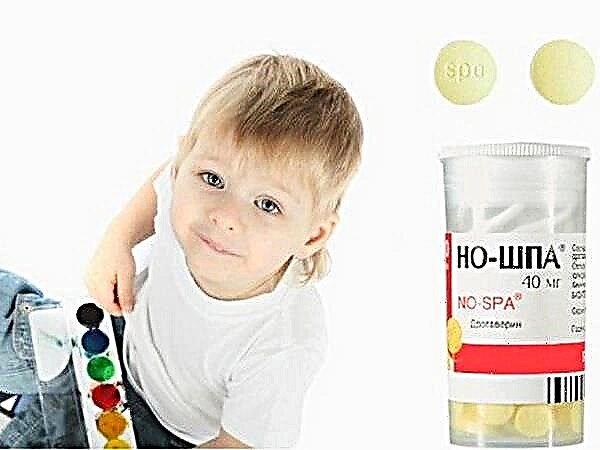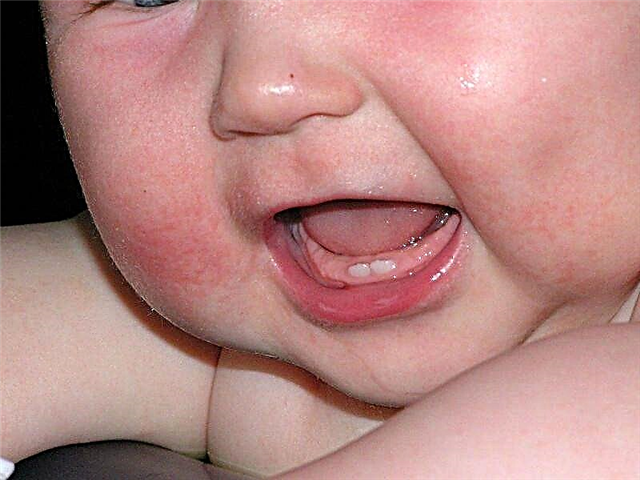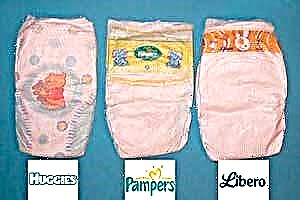The question of a baby not breastfeeding is not new today. It can appear immediately after the birth of a baby while still in the hospital, where the baby can scream, cry, try to suckle the breast, but after a short time give it up. Sometimes a newborn, months later, turns away when feeding, can freak out, be capricious, forcing the mother to worry and quickly strive to mix an artificial milk substitute. However, a bottle of formula is not always the right solution. Initially, you should calculate the reasons why the baby does not breastfeed, and try to restore quality breastfeeding.

Newborn refuses breast
Reasons for refusing breast milk at 2-4 months
Why does a child of two to four months not pick up the breast and can even turn away from it? The children's world in this period of life begins to become more global. The kid wants to consider everything, to hold it himself, to make some new movements with the pens, to surprise the parents with a loud ringing laugh. He can stay alone longer, studying the space around him, everything makes a strong impression on him.

The kid is distracted by his mother, sounds and noises
Pediatricians call this "false refusal" and report that there is nothing wrong with such behavior of the baby, nothing needs to be done with it. It is important to keep an eye on the baby, probably after a few minutes of looking at mom, the nursery or listening to sounds, he will return to feeding.
Important! Up to 3-4 months, a baby may have a severe tummy pain, he is worried about colic. At such moments, which come at a certain time of the day, the crumbs are in a bad mood, he worries and screams strongly, tightening his legs. At this time, the baby, as a rule, turns away from the breast. Therefore, before feeding, it is worth relieving spasms. For example, do a tummy massage, put a heating pad. In rare cases, you can bathe in a warm bath: the baby will flounder, thereby the pain will subside.
Using bottles
This is one of the most common reasons for refusing GW. Mom, in an attempt to feed the baby, uses a bottle of expressed milk or formula, gives a nipple to wait out the intervals between feedings. At the same time, not only the mother suffers, because the arriving milk is becoming less and less, but also the baby who tries to suckle the breast in the same way as the nipple, the bottle. He "confuses" nipples, cries and refuses to breast. This is understandable - when breastfeeding a baby should make much more effort than when sucking a substitute. He does not want to work, so the guards will soon be over.
Changing the taste of milk
Milk changes its taste throughout the entire lactation period. If at the very beginning it is more nutritious, fatty due to the active growth and development of the crumbs, then later, when complementary foods are introduced, it becomes lighter, quenching thirst.
If mom has given herself excessive sports loads, for example, went to strength training in the gym, then milk can change the taste, because lactic acid has entered into it. The baby may not like this, and he will begin to refuse to feed.
The best solution is to feed pre-workout or skip lactation workout for walking, cardio, and jogging.
Note! If a woman succeeds in getting pregnant during lactation, then the milk can change its taste, and the baby, feeling this, will independently wean from the breast.
Mom has a "wrong" smell
The baby does not want to suckle when the familiar scent of the loved one has suddenly changed. If a mother uses deodorants, body creams in the breast area, then the child will be confused - for him it is an unknown, unpleasant smell.
For the period of guards, you should abandon cosmetics with a bright aroma. If suddenly the baby does not like her mother's smell, then it is worth washing the skin using baby soap and changing clothes.
Sick child
As soon as the baby starts to have a cold, a runny nose occurs, or he is worried about some other ailments, he may begin to refuse to breast. In one case or another, first of all, you should contact your attending pediatrician who will recommend methods of dealing with the disease. It is not worth stopping breastfeeding, you may have to express milk for some time to maintain lactation.

Breast refusal during illness
Refusal of hepatitis B immediately after childbirth
How to force a baby to take breast after childbirth - this question worries most new mothers, especially those who are not experienced in this. However, nature will take its toll, and soon, with the right approach, the baby will begin to suckle the breast. You should often offer it to him, pay attention to the correct grip and posture when feeding. If the child was born weak and premature, then this issue is resolved in a comprehensive manner.
The baby may not breastfeed, not only because of his illness or mother, an excessive amount of milk, when its flow is so strong that the baby begins to choke, but also for the physiological reasons of the mother.
Nipple shape
The shape of the nipples of the breast after feeding the baby changes somewhat: they become more elongated, their surface slightly coarsens. However, it happens that the mother cannot start GV due to flat, sunken nipples. It is difficult for a baby to adapt and start sucking. It should be understood that this is not at all an obstacle to feeding. More important is how the areola and breast tissue can stretch when sucking. Sometimes, in order to avoid the maturing problem, you can resort to special overlays.

Flat nipple cover
Premature baby
Such children do not have a pronounced sucking reflex, they cannot even take the breast. In view of this, they are fed through a special tube. Also, a similar problem occurs in infants who have gone through difficult childbirth: oxygen starvation, the presence of lesions of the nervous system, trauma during childbirth. The maturation of the parts of the brain slows down, so the baby cannot suckle or suckles it a little, gets tired quickly, refuses and immediately falls asleep.
What should mom do
For a baby, a mother is a whole universe, that person with whom it is calm and easy. The child does not separate himself from his mother, he sees himself with her as a single organism. Therefore, any excitement, anxiety can be transmitted to the baby: he is also worried, crying and screaming.
First of all, you should be patient, act soberly, turning off any panic. All questions can be resolved if you turn to breastfeeding consultants, pediatrician, midwives in the hospital in time. You should not be ashamed to ask questions and ask for help - any doubt about this situation will help avoid problems in the future.
Important! During the guards, fluorography cannot be done - it harms the baby. Harmful radiation negatively affects the composition of breast milk.
Maternal health problems
As a rule, when breastfeeding with well-established lactation, the whole mechanism works harmoniously: the body clearly "feels" when the baby wants to eat, and milk flushes come at a certain time.
Even if the mother is sick, she can maintain HV, provided that there are no severe pathologies in the identified disease, or doctors do not recommend continuing feeding. It's good if mom has a "milk bank" - expressed milk that's frozen in the freezer for such occasions. The mother remains to express her breasts during the treatment period so that lactation is preserved.
Also, during this period, the mother needs good, high-quality nutrition, rich in vitamins and trace elements, in order to raise, strengthen the immune system and continue guards.
Causes of the baby's ill health
Diseases in a baby on gv are quite rare, since feeding with milk determines the presence of protection of the crumbs from the negative effects of the environment. However, they do happen, you need to know how to act to quickly solve the problem.
The most frequent situations when the baby is unwell and she refuses to breast:
- thrush of the oral cavity;
- otitis media - pain in the ears;
- runny nose and swelling of the mucous membrane;
- teething;
- intestinal colic.
Teeth being cut
During such periods, the baby is very capricious, can either constantly "hang" on the chest, or refuse it, because she is worried about pain. Sometimes he tries to bite his nipples to "scratch" his gums. For some children, this period runs smoothly and imperceptibly.

Teething process
Note! The rapid appearance of teeth is indicated by strong salivation. The kid wants to gnaw everything, pulls various objects into his mouth, his gums swell and turn red.
Hot climate intolerance
If the climate does not suit the baby, he may begin to give up breast. The downside is also the appearance of increased sweating, prickly heat is manifested.
Thermoregulation in infants is somewhat different than in adults, so overheating threatens with serious consequences. In such situations, the baby needs hydration and extraordinary bathing.

The baby needs extra washing in hot climates
Effects of maternal health on milk taste
The mother's emotional and mental states directly affect the taste of milk. Under the influence of hormones, it becomes an unusual aroma for the baby. Mom's good health is the key to a successful guards.
There is no direct connection between the composition of milk and what the mother eats, as already proven by medicine. There are some foods that do affect its taste:
- garlic, onions;
- vanilla, sugar;
- pepper, pumpkin;
- spice.
It is worth changing the diet from what it was during pregnancy only if the baby has an allergy, or he does not like the taste of milk after the mother eats certain food.

The diet of a nursing mother
Mom's poisoning is a barrier to hepatitis B
Is it possible to feed a baby with breast milk in case of poisoning? It is possible, viruses are not transmitted through milk. If the causative agent is staphylococcus, salmonella or botulism sticks, that is, if the mother is poisoned badly, she needs treatment and a course of therapy, the use of antibiotics and antimicrobial drugs. The latter can just penetrate into milk and adversely affect the baby.
When asked if it is possible to breastfeed a child with mild poisoning, the answer is yes. In this case, the baby is not in danger, on the contrary, with milk he will receive antibodies that are formed in the mother's body when fighting an intestinal infection.
If the baby refuses to breastfeed, this is a sign that there are some points that need the mother's attention. By resolving them, it is likely that everything will work out and become as before. All questions can be answered, you just need to act responsibly.



